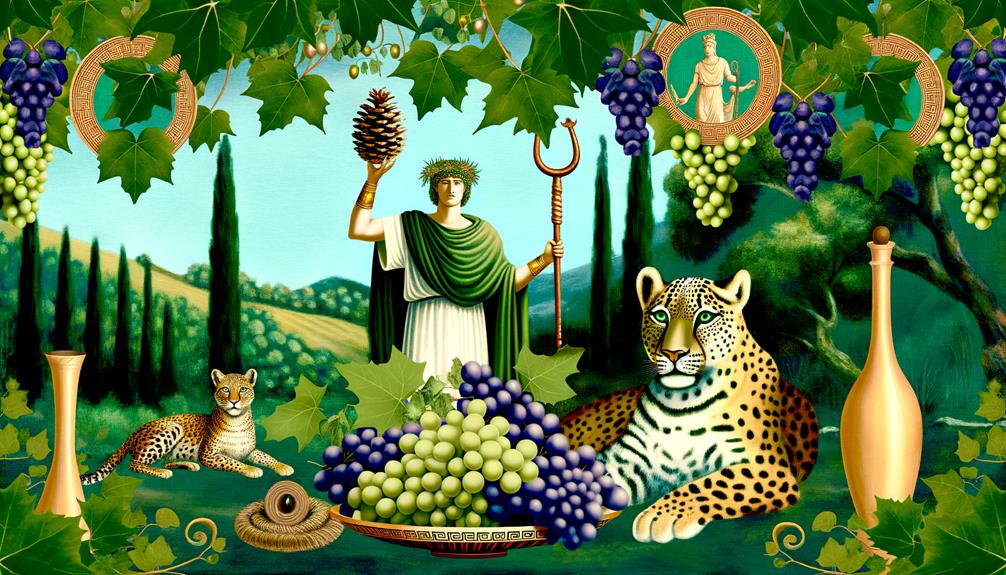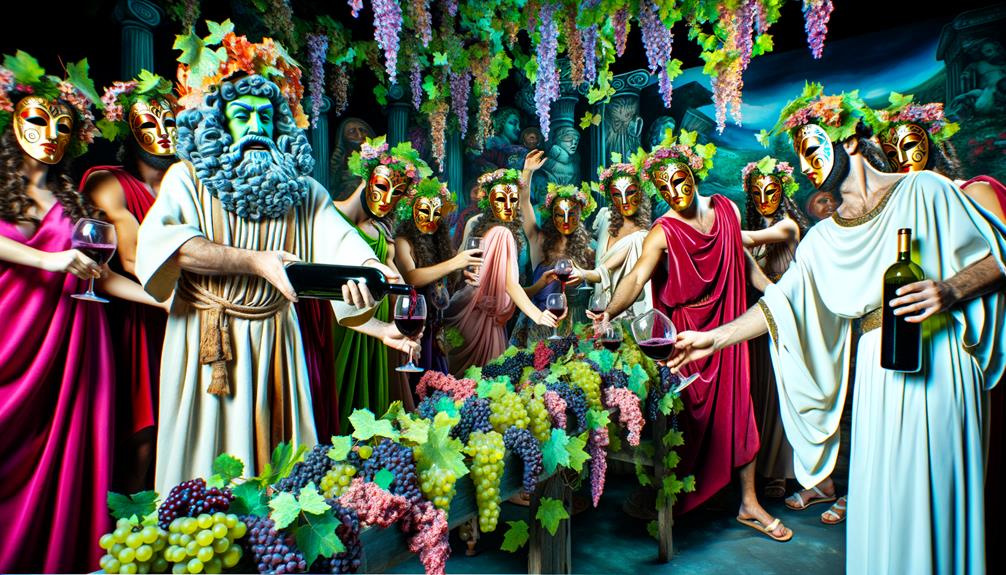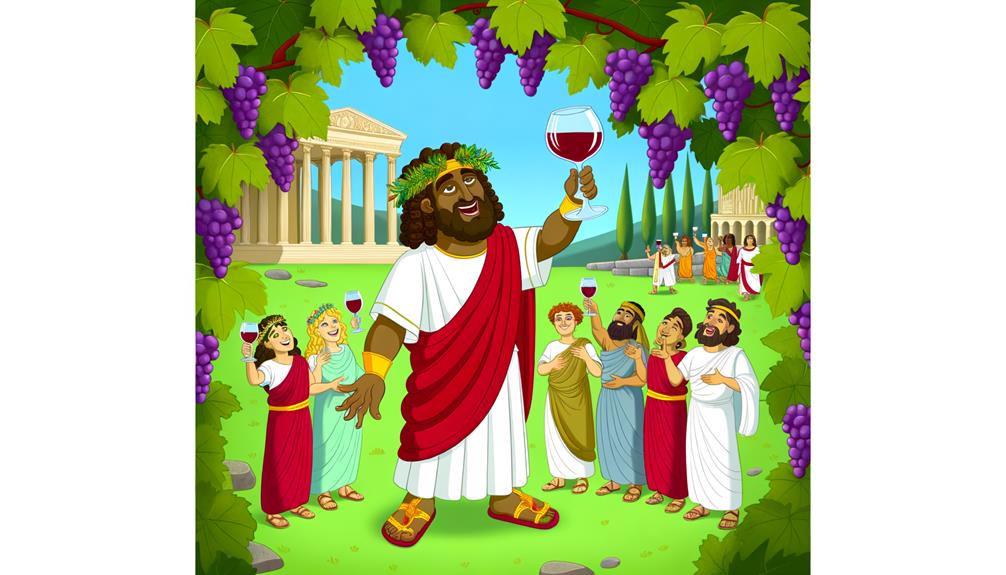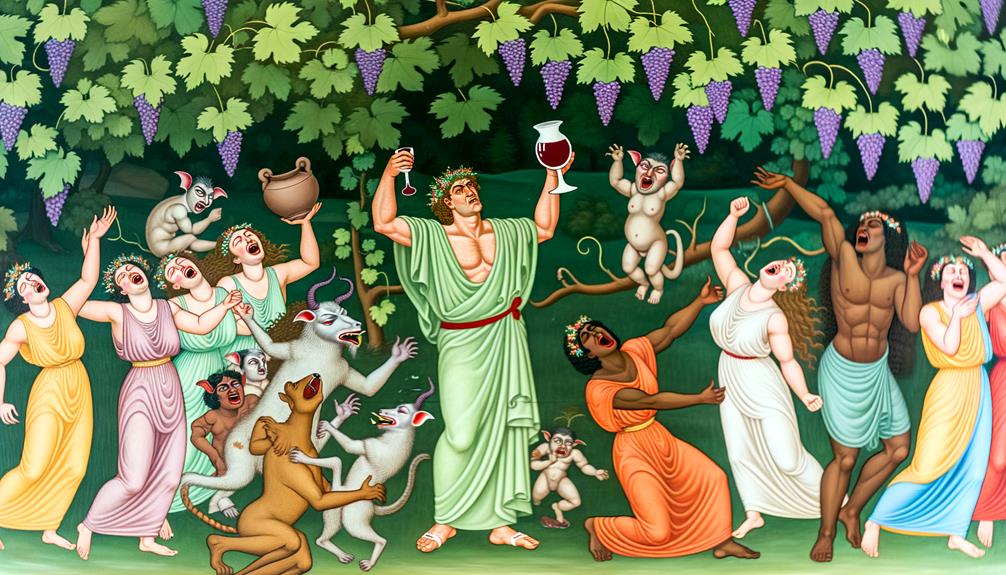Walking down the path that Orpheus once did, I can't help but think about Dionysus, that infamous Greek God known for wine, fun, and a kind of divine insanity. Dionysus was famous for his love of wine and the wild parties that happened in his honor. His tale is all about freedom, about breaking free from societal norms through joyous celebration.
The ways people worshiped him were pretty intense and raw – think wild dances, all-you-can-drink wine, and a total disregard for the usual rules and order of everyday life. But don't let the chaos fool you, there's a whole lot of deep thought and symbolism hidden within Dionysus' festive antics.
If you've ever wondered about the deeper meaning behind this mythical figure, come with me as we unravel the thrilling tale of Dionysus and what his wild parties really mean.
Dionysus: Birth and Legends

The story of Dionysus, the Greek god of wine, is a tale of intrigue and conflict, filled with human passions and divine interventions. Dionysus wasn't your average deity. He was the son of Zeus, the king of the gods, and a mortal princess named Semele. This unusual heritage marked his life from the very beginning.
Zeus saved Dionysus from his dying mother in a unique way – by sewing him into his own leg. This act made Dionysus a twice-born god, a status that set him apart among the gods of ancient Greek religion.
Dionysus grew up under the care of nymphs, who celebrated his presence with wild parties and excessive drinking. His teachings, however, weren't always well received. For instance, King Pentheus of Thebes dismissed Dionysus' teachings, and was met with harsh and severe punishments – a clear demonstration of Dionysus' divine power.
Dionysus left his mark not only on the people of his time but also on their culture. He was linked to wine and ecstatic joy, and his influence can be seen in art, literature, and religious practices. His followers celebrated him in a variety of ways – from public festivals to the secretive Dionysian Mysteries, ceremonies that symbolized freedom and defiance of norms.
To truly understand Dionysus, one must dive into the complex emotions and desires he represents – ecstasy and fear, the thrill of defying rules, and the deep desire for freedom. It's not just about understanding a god, but also about exploring these powerful, timeless human emotions.
Symbols and Worship of Dionysus

Let's chat about Dionysus, who stands out in Greek mythology as the god of fertility, ecstasy, and transformation. Known as the God of wine, theater, and wild parties, Dionysus is represented by a bunch of symbols. We're talking about the thyrsus, which is a scepter made from a fennel stem, ivy wreaths, grapevines, grapes, theater masks, and wild animals like panthers and leopards.
Now, when it comes to Dionysus worship, it's a fascinating mix of public spectacle and hush-hush rituals. There's this big festival for Dionysus where people put on dramatic performances, dance like crazy, and let's not forget, drink a lot of wine. The Dionysus cult also had these super secret rituals called Dionysian Mysteries, all about liberation and, you guessed it, more wine drinking.
Let's break down Dionysus worship into three main parts:
- Symbols that stand for nature, fertility, and transformation.
- Rituals and festivals where people dance ecstatically and party hard.
- How Dionysus' worship affected Greek society, art, and culture.
Here's a fun fact: Dionysus was the son of Zeus and a mortal woman named Semele. This made him a connection between the divine and human worlds. Worshipping Dionysus was all about celebrating the power of wine, music, and dance to free people from their worries and fears.
Dionysus and Greek Theater

Dionysus and Greek Theater are like two peas in a pod. Dionysus, the theater's patron god, had an impact that can still be felt in the plays and performances of that period. He was the embodiment of human existence's joys and sorrows. The ancient Greeks held him in such high esteem that they thought the Theater of Dionysus in Athens was dedicated to him.
What was Dionysus' impact, you ask? Well, here's a handy table to break it down:
| Greek Theater | Dionysus in Athens | Dionysus Influence |
|---|---|---|
| Came into its own in the fifth century B.C | Honored with dramatic performances | Wove themes of joy and sorrow |
| Took place in the Theater of Dionysus | Theater's patron god | Central to performances |
| Dedicated to Dionysus | Drama's birthplace | Trigger for emotional release |
Greek theater and Dionysus were so important that they left a lasting mark on the cultural and religious life of the time. Performances weren't just for kicks; they were a form of worship, a tribute to Dionysus' might. To get a grip on Greek theater, you've got to get a grip on Dionysus – the god whose influence can still be felt in every line, every performance, every round of applause.
Influence on Roman Culture

Let's chat about Rome and how they took to Dionysus, the Greek god of wine. They really took him in, renamed him Bacchus, and let him have a big impact on their art, literature, and religious rituals. This Greek god became a key part of Roman culture.
When it comes to art, the Romans really took a liking to Bacchus. You'd often see him in paintings, often holding a glass of wine, showcasing the importance of wine and partying in Roman culture.
Dionysus had a big impact on Roman literature too. His stories were rewritten with a Roman spin, adding more depth to their myths and legends.
Dionysus also influenced Roman religious practices. Bacchanalia, a festival with wine and joy at its center, was a lot like the Dionysian festivals the Greeks used to have.
It's pretty clear Dionysus had a big impact on Roman society. All of Bacchus' festivals, rituals, and myths came from Dionysus. By bringing these elements into their own culture, the Romans kept Dionysus' essence alive and also added to their own cultural identity.
Bacchus' influence on Roman culture is a true testament to Dionysus' enduring impact.
Dionysus in Modern Interpretations

Dionysus, the Greek god known for wine and parties, has left a lasting impression that extends far beyond Roman culture. His charm seeps into today's world, impacting areas such as art, literature, and religious customs. His narrative, filled with wine-induced revelry, continues to be a source of inspiration.
Consider the story of Dionysus magically turning water into wine. This tale has been reimagined in numerous works, serving as a symbol of the hazards of losing self-control. It encourages reflection on themes like intoxication, liberation, and merriment.
The narrative of Dionysus' birth and the identity of his father, Zeus, have also sparked modern interpretations. The story of his birth from Zeus' thigh provides a unique take on divine lineage, and his father's position as the king of the gods reinforces Dionysus' high status.
In today's interpretations, Dionysus symbolizes breaking free from societal norms, promoting the exploration of individuality and transcendence. The lure of his character remains strong in literature, films, and the performing arts, exemplifying his enduring influence.
As a result, the spirit of Dionysus is alive and well in our modern world, continuing to be a strong influence.
Frequently Asked Questions
Is Dionysus the God of Revelry?
Absolutely, Dionysus is recognized as the god of merrymaking. In the tales of Greek mythology, he's constantly connected to wine, joy, and festivities. His sway touches on multiple parts of life such as art, literature, and he even played a role in the birth of theatre.
What Is Dionysian Revelry?
Dionysian revelry? Oh, it's quite a party! Picture folks letting loose, celebrating life's wilder joys. All sorts of lines get blurred, between what's holy and what's not, all swept up in a shared, exhilarating thrill. It's like giving in to our most basic instincts, and through uninhibited happiness, feeling a divine connection.
What Is Dionysus the God of Wine?
Let's have a chat about Dionysus, recognized as the god of wine. But let's not forget, his influence stretches beyond just wine. He stands as a symbol of fertility, has a strong connection to the arts, particularly theater, and is associated with intense joy and unrestrained freedom. His stories serve as a bridge between us humans and the divine entities, helping us decipher life's riddles and contradictions.
What Was the Dionysian Wine Ritual?
You know, the Dionysian wine ritual was quite the spectacle. When I studied it, I found out it included sipping wine, dancing with abandon, and enjoying music. And guess who they were celebrating? Dionysus – the Greek deity of wine, fertility, and fun times. It was quite the wild party to say the least.
Conclusion
Amid the tranquility of the vineyard, the riotous merriment of Dionysus still resonates. This god of wine, once central to frenzied dances and wild parties, remains a part of our present-day celebrations. His essence infuses our moments of self-indulgence, standing as a timeless symbol of freedom and unrestrained happiness.
But Dionysus isn't just a leftover from old Greek drama or Roman customs. He's alive and well in our art and literature. Dionysus serves as a reminder of the divine rapture that lies at the heart of wild freedom.

